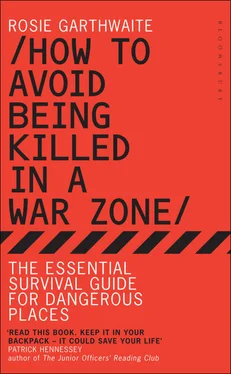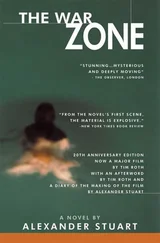‘Iranians like foreigners a lot and are very hospitable towards them. Don’t take it as a threat if someone chats to you in the street or opens up the subject of politics. They are just interested in what you’re doing there.’
The country formerly known as Burma is a difficult place to work in or visit. The government is especially hostile towards their old colonizers, the British, but they are equally harsh on their own people if they consider them to have been disloyal to the country. It takes very little for them to leap to judgement. So whether you are travelling as a tourist or otherwise, you need to be extra cautious in your behaviour. If you get caught doing something the authorities don’t like, the chances are that you will have tainted everyone you came into contact with along the way.
A former colleague of mine is now an NGO worker in Myanmar. He has been there for years – through the government suppression of the monk-led riots of 2007, and cyclone Nargis a year later, which killed an estimated 134,000 people and devastated the most fertile parts of the country. He has chosen to remain anonymous because he wants to be as honest as possible in explaining why, despite the repressive government, everyone should visit the beautiful country that has become his home and, to him at least, is ‘the safest country on Earth’.
‘According to George W. Bush’s administration, Myanmar is an “outpost of tyranny”, not quite an “axis of evil”, but a badass place nonetheless. It is indeed true that the country has a less than charming military dictatorship that is hopelessly inadequate at governing, and is sometimes described by expats as a “kleptocracy” or “ineptocracy” whose sole aim is to strip the country of its abundant natural resources, pocketing what they can and putting nothing back into the “Union”. These sad old men in green, paranoid to a fault, bicker and quibble amongst themselves in their malarial jungle lair while stuffing their Singapore bank accounts with ill-gotten gains and waxing lyrical about democracy and a “discipline flourishing nation”.
‘Here are a few pointers to keep you out of the local prisons and on the straight and narrow. First and foremost you have to know who to trust. When you step off the banana boat, all fresh faced and doughy eyed, you cannot help but be charmed and seduced by the long-suffering and repressed locals. Their hospitality is second to none, their charm is engaging, their smiles are enough to melt the polar ice-caps, their devotion to Buddhism undeniable. But be warned, for beneath a veneer of all these qualities lurk some of the most conniving, double-crossing, two-faced backstabbers ever encountered. They would sell their soul and that of their mother for a few thousand kyat. Fortunately, most of the people aren’t like that – they are the loveliest you are likely to meet. But when they are bad, they are really bad.
‘Corruption is rife. It is impossible to do anything in Myanmar without having to pay “outside money” or “tea money”. Accept this and you will not be driven mad at having to pay a bribe so that your telephone line is not routinely cut by the very people who are meant to be maintaining it. Fight against it and you will age at an alarmingly fast rate. In this respect the country is rotten to the core, which to my mind is the single largest obstacle holding the country back, preventing it from joining the rest of Asia in “developing”.
‘Do not talk politics. Most importantly, do not discuss politics with a local unless they bring it up with you. This is potentially a fast-track way for the local to head straight to jail. It is also the best way for you to get thrown out of the country and never be allowed back.
‘Expect numerous power cuts, the local telephones not to work, the Internet connection to be woefully inadequate, and the general infrastructure to be nothing short of hopeless. There was a joke when the capital moved from Yangon to Nay Pyi Taw a few years back that there had been a “shift in power” quite literally, as all the electricity was moved to the new jungle lair of the junta. Take a torch.
‘The city abounds with rumours. Did you hear this, did you hear that? When you first arrive you’ll be seduced by these rumours. They flesh out the life of a country that few people know little about. However, it will not take long for you to gather that roughly 90 per cent of them are simply hot air.
‘I have lived through a civil protest where hundreds of thousands of people took to the streets in a peaceful demonstration and were cruelly beaten down. I endured a cyclone that claimed the lives of many thousands of people and left swathes of the country utterly devastated. Yet for me, Myanmar is still the safest country on Earth. Arriving here feels like stepping back in time. This is obviously a nuisance for the locals, who would like their country to develop a little more to ensure a better life for them and their children, but from a visitor’s point of view, it does not get any better than Myanmar.’
Donald Kirk first visited Seoul, the capital of South Korea, in 1972 for the Chicago Tribune , and has been reporting on the region for international media outlets ever since. He has a unique ability to cut through the dense rhetoric and misunderstanding surrounding news from North Korea. At the moment he is the Korea correspondent for the Christian Science Monitor . He offers the following insights.
‘North Korea is undoubtedly one of the most dangerous countries on Earth, but that’s only if you’re a citizen of it and living in constant fear of the dictatorship of “Dear Leader” Kim Jong-il. About 200,000 people live in a vast gulag for political prisoners, and thousands more are imprisoned for lesser crimes. Public executions and torture are common, and millions are suffering from hunger and disease. As a visitor, however, you will see none of this while spending a few nights in a luxury hotel and dining out in fine restaurants in the capital city of Pyongyang.
‘The real difficulty in writing about North Korea is posed by tour guides, who monitor your every move and will not let you out of their sight. I had my most trying encounter in September 2008, when I taped a brief conversation with a guide in which he insisted that Kim Jong-il was not sick, had not suffered a stroke and that all the reports about his illness were “lies” spread by CNN and the BBC. He knew that I was taping the conversation, but a few hours later asked me to delete the recording or give him the tape as he was not “authorized” to speak for the regime. I refused. That evening, at a meeting of the members of my group, he and his superior again asked for the tape, and again I refused. They reminded me of the severity of the “security agency” and said agents might stop me from leaving when I got to the airport the next morning at the end of my standard four-day visit. I decided to take my chances. When I got to the airport the next morning, no one said anything, and I was able to leave without a problem.
‘The threat, however, was a reminder of the difficulties of covering North Korea even when all you have done is to record a conversation with a tour guide who merely repeated the propaganda of the regime. Tour guides also warned us of expulsion from the country if members of the group went on their own in search of interviews.
‘On one of my four visits to Pyongyang they had us list our occupations and the names of the companies for which we worked. Since American journalists were banned, I had told the tour organizer in Australia to list me as a teacher, even though he knew I was a correspondent. I said I worked for “The School of Hard Knocks”. Nobody questioned that affiliation.
Читать дальше




![Джонатан Димблби - Barbarossa - How Hitler Lost the War [calibre]](/books/385421/dzhonatan-dimblbi-barbarossa-how-hitler-lost-the-w-thumb.webp)







